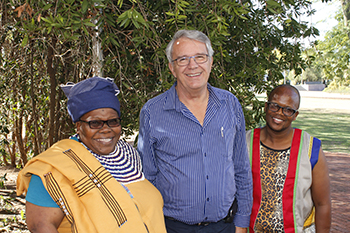Latest News Archive
Please select Category, Year, and then Month to display items
14 June 2024
|
Story Anthony Mthembu
|
Photo Suplied
 Jeremiah Hlahla, a UFS student completing his PhD in Botany at the University of Debrecen as part of an exchange initiative funded by the Erasmus+ Mobility Programme.
Jeremiah Hlahla, a UFS student completing his PhD in Botany at the University of Debrecen as part of an exchange initiative funded by the Erasmus+ Mobility Programme.
As part of an exchange initiative facilitated by the Erasmus+ Mobility Programme, Jeremiah Hlahla, a student at the University of the Free State (UFS), is nearing the completion of his PhD studies at the University of Debrecen in Hungary. Hlahla’s journey, which began in February 2024 and is set to conclude in July 2024, has been a remarkable learning opportunity. “As a first time-traveller to Europe, I have thoroughly enjoyed engaging with people from different countries and cultures,” he said.
The benefits of international collaboration
Hlahla is currently pursuing a PhD in Botany, focusing on plant stress physiology. “My current PhD project investigates the physiological, biochemical and morphological responses of vegetable-type soybean, or edamame, to combined drought and heat stress,’’ he explained. He considers the University of Debrecen the ideal institution to complete his research due to its extensive expertise and resources in similar projects. He noted that his colleagues at Debrecen conduct significant work on plant protection against biotic and abiotic stresses, including salt and drought stress, as well as proteins and amino acids in barley and other legumes.
Given the vast knowledge available on similar projects, Hlahla has found substantial engagement with his work at the University of Debrecen. “Upon arrival, I delivered an introductory lecture presenting my UFS project on the synergistic effects of combined drought and heat stress on the physiology and biochemistry of edamame. It was an engaging session as everyone could relate to my work and asked many questions,’’ he said.
Insights gained from the exchange
Hlahla has also gained valuable lessons that will assist him in his research career, including biotechnology and physiology tools. “I learned how to prepare samples and use high-performance liquid chromatography (HPLC) and reversed-phase ultra-high-performance liquid chromatography (UHPLC) to quantify proteins and amino acids,’’ he said. These techniques are beneficial not only for his current work but will also support future soybean research.
As his experience at the University of Debrecen nears its end, Hlahla reflects on the collaborations and friendships he has formed, which stand out as a significant highlight.
UFS Faculty of Theology hosts expert on African Traditional Religion (ATR)
2016-05-20

Dr Nokuzola Mndende, Prof Fanie Snyman (Dean of the Faculty of Theology), and Dr Luvuyo Ntombana (Department Head: Religion Studies) |
Dr Nokuzola Mndende, an acclaimed theologian, researcher, and practitioner of African Traditional Religion (ATR), is often called upon in the media to offer her expert opinion or participate in interfaith panel discussions. Thanks to an initiative from the postgraduate diploma class in the Faculty of Theology and the efforts of Dr Luvuyo Ntombana (Department Head: Religion Studies; Faculty of Theology), Dr Mndende accepted an invitation to present her paper, “From the periphery to the centre: African Traditional Religion in a democratic state”, on the Bloemfontein Campus of the University of the Free State (UFS). In his opening remarks, Dr Ntombana stated that he was heartened by his students’ desire to be “co-workers in knowledge production” by engaging with Dr Mndende.
Dr Mndende’s contention is that African Traditional Religion (ATR) was suppressed throughout colonial times, and, despite a 22-year-old democracy, continues to be moved to “beyond the periphery” by what she terms “spiritual subsets”; those who strive to amalgamate their African Traditional Religion rituals with the practices of Christianity. Quoting statistics from a 1995 survey by the SABC, she stated that ATR is a minority in its birthplace (with only 5% representation), and posed the question: “If ATR is a minority in its place of birth, where is it a majority?” Her presentation put forward the need to study and interpret ATR introspectively, but acknowledged that more “homework” would be needed in this regard.
Dr Mndende thanked the university, Dr Ntombana, and the Dean of the Faculty of Theology, Prof Fanie Snyman, for inviting her, and expressed a desire for the relationship with the UFS to continue.